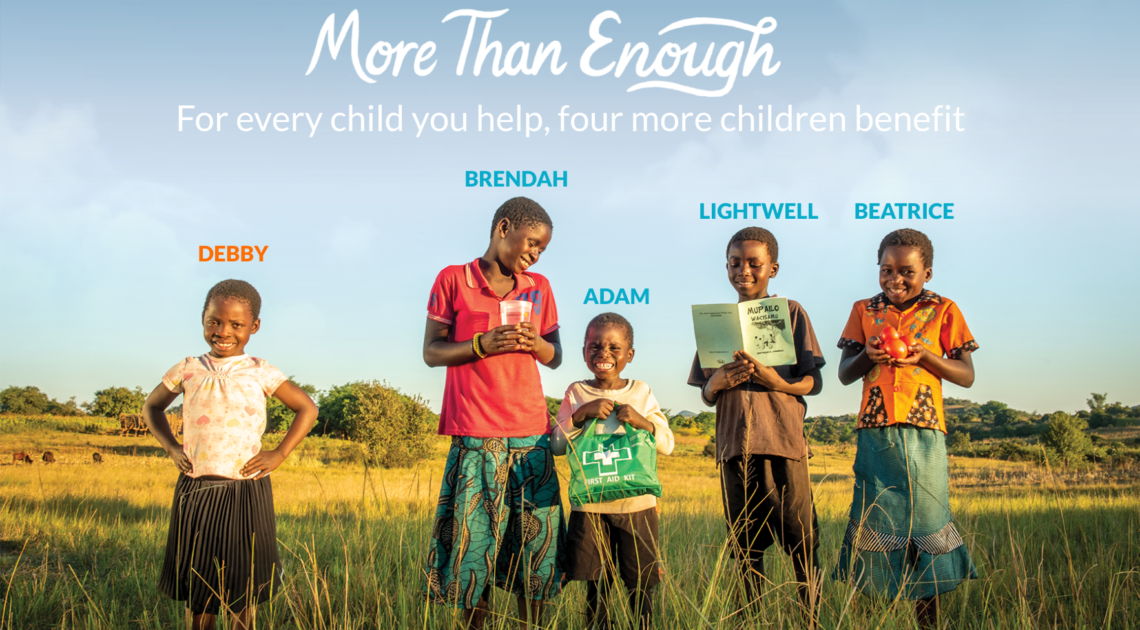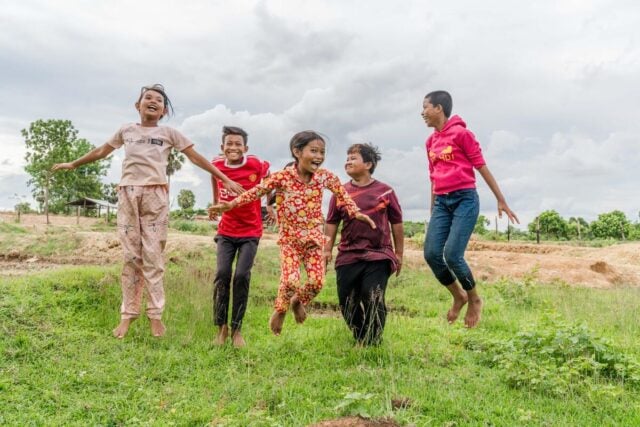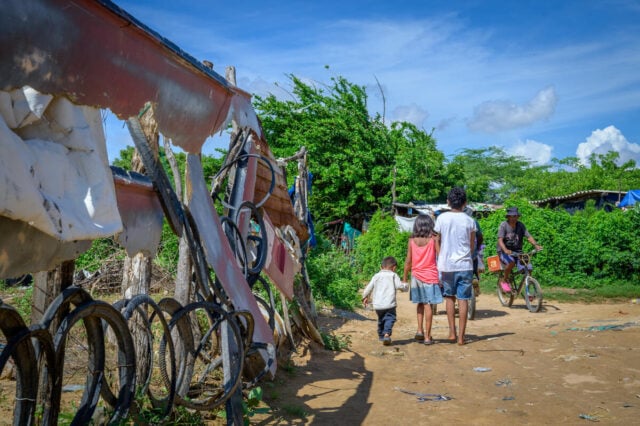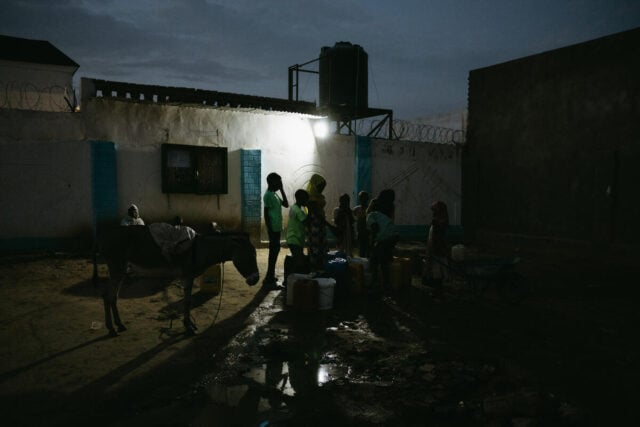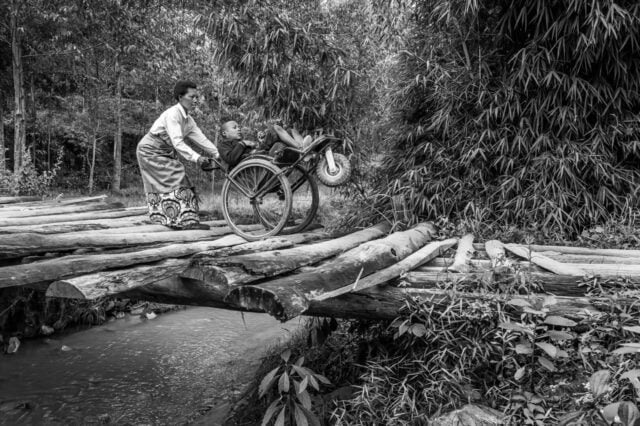Because of our community-focused solutions, for every child you help, four more children benefit, too. Debby and her friends are all benefiting thanks to the fact that she’s sponsored.
It’s Christmas morning in Moyo, a village in southern Zambia. The rain drums unevenly on the tin roof of a small house — unceasing but soothing, peppering the dreams of the family sleeping inside. Enter the squawk of a guinea fowl, piercing the morning like a violin, and a chorus of quail, their chirps as bright as a piccolo. Begin the indoor symphony of sound: the soft rustle of blankets, the whisper of voices, and the unguarded yawns of children greeting the first light — children like Debby.
Debby loves Christmas. The vivacious 7-year-old relishes every day, but Christmas is special. On that day, says her father, there is “more than enough” — more than enough food, and now that they no longer have to walk for water, more than enough time to celebrate. And not just for Debby. Because of World Vision’s community-focused solutions, for every one child a donor helps, four more children benefit, too. In Zambia and around the world, a child doesn’t have to be sponsored to benefit from sponsorship.
That’s why on Christmas, four of Debby’s friends who aren’t yet sponsored — Brendah, Lightwell, Beatrice, and Adam — are also waking up with anticipation.
It wasn’t always like this for children in Moyo.
Christmas past: The struggles before child sponsorship
Grief echoed through the village the day Debby’s brother died. Before Debby was born, the 6-year-old succumbed to diarrhea caused by drinking water from a polluted stream.
“Death was very common in those days,” remembers Debby’s 52-year-old father, Obby Kachepo, with sadness in his kind eyes.
The family scraped by, living in a grass-thatched hut that leaked when it rained. Neighbors begged neighbors for food. Misery flourished. “We lived more or less like animals,” says Obby.
The day to celebrate Jesus’ birth was, for their family, just another day.
“On Christmas, we would tell the children not to go to another home,” says Obby, who didn’t want his kids to see others celebrating and realize how poor they were. “We didn’t want them to see the difference.”
The family needed a miracle.
“God answered our prayers through World Vision,” says Obby. “When World Vision came, that’s when the change came. Now Christmas is better.”
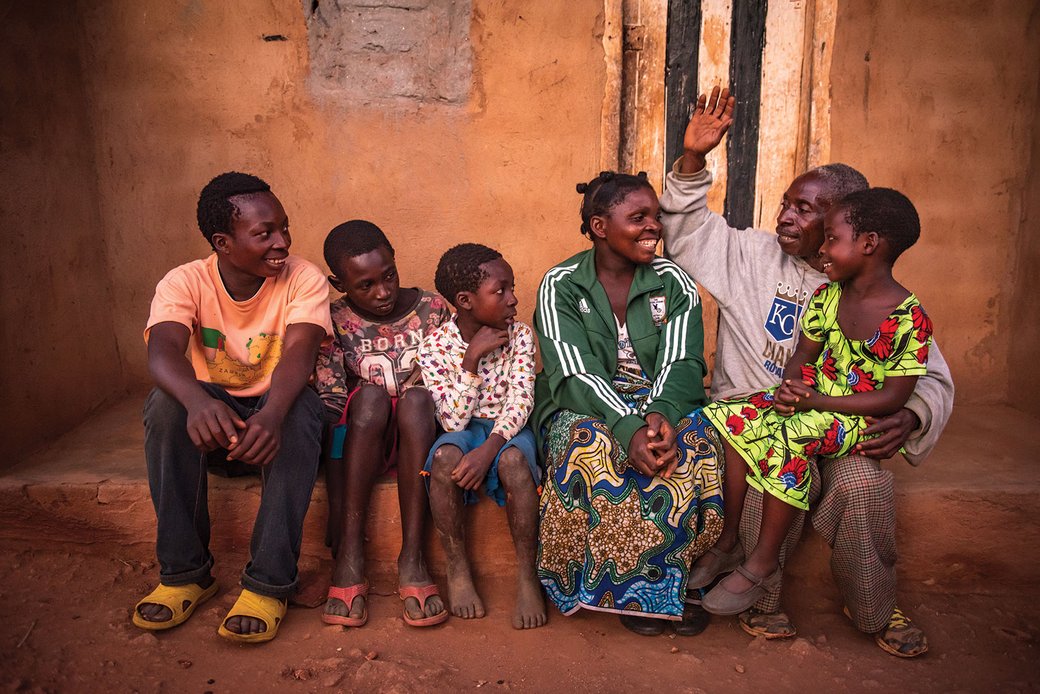
In October 2009, World Vision started child sponsorship in Moyo. Local staff asked for volunteers to serve as “caregivers” by regularly monitoring children’s health and well-being. Caregivers look out for the children in the community. Obby joined the team, becoming responsible for 120 children.
The caregivers faced challenges. According to village chief Stephen Moyo, people were moving away to find clean water, healthcare services, and jobs. In 2009, Moyo had the lowest rate in the area for children attending school past eighth grade: only 1 in 3. And the community was battling the stigma attached to HIV and AIDS.
Through the sponsorship program, World Vision worked with local leaders to tackle these challenges. Fortunately, sponsorship is a magnet for other funds, like government grants and generous gifts from donors who want to invest in community-based, long-term development — meaning sponsors’ gifts are multiplied in impact.
Funds from World Vision’s Campaign For Every Child were used to drill seven new borehole wells and repair five broken ones, and community members like Obby received training to promote good hygiene. Caregivers helped distribute bicycles so students and teachers could ride to school on Moyo’s rutted roads.
Savings groups, called village banks, were started. The 32 groups, made up mostly of women, were able to save thousands of dollars — their first savings ever. And World Vision worked with faith leaders to turn condemnation into kindness toward people living with HIV and other diseases, and brought in medicine to treat them.
In 2011, the year Debby was born, World Vision began providing goats to families in Moyo. Staff invited community members to choose 50 vulnerable families from among themselves to each receive four female goats from a local supplier and a male goat from outside the community — a “super goat.”
“The breed which World Vision brought was a different breed,” says Obby. “They were big goats. The crossbreeding made our traditional goats bigger.”
The 50 families learned to care for the goats, including how to build shelters to keep them safe. When the animals multiplied, the families would give the baby goats to other families.
In July 2012, Debby was sponsored by an American woman named Debbie and her husband, David. The couple attended NorthRidge Church in Michigan, where church members sponsor nearly 3,000 children in Moyo and a nearby community. The next year, Debby’s family received five goats from a family whose goats had multiplied.
Steadily, Moyo was transforming. Families were thriving, and an exuberant little girl with a big smile was actively loved and prayed for by a woman with the same name who lived 8,000 miles away.
Every project World Vision introduced was infused with God’s love. Children could attend Good News and Scripture Union clubs. Caregivers like Obby were encouraged to keep God central in every activity and community gathering. Savings groups, hygiene training, borehole drilling — each assembly began with prayer. The 2009 report from Moyo concludes, “Communities actually demand that each meeting starts with a prayer and ends the same way.”
Brendah, 12: No longer afraid while gathering water
The joy of sponsorship has flowed down Moyo’s sunflower-lined paths to the home of Debby’s best friend, Brendah Milambo. Brendah lives with her 73-year-old grandmother, Elinah, and six other children either orphaned or left behind by their parents.
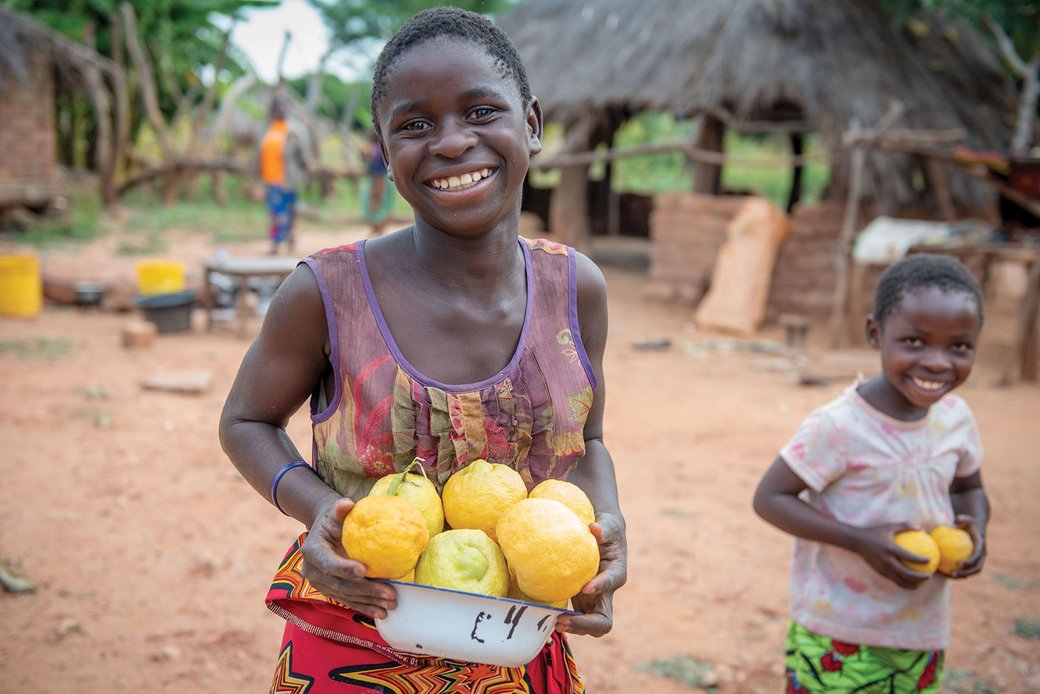
Brendah is tall, while Debby is short. Brendah is shy, while Debby is given to spontaneous belly laughs. At 12, Brendah is older than Debby, but something about this friendship works. The girls talk and laugh as they walk to get water at a nearby borehole well installed by World Vision.
Even though Brendah is not sponsored, she — like every child in the community, sponsored or not — has access to this clean water brought by sponsorship. And it’s completely changed her life. She used to collect water from a dirty stream.
“When the stream was high, I feared that I might drown,” she says.
Indeed, confirms Elinah, children in Moyo used to drown getting water. Brendah would miss school because of water-related illness too. In Moyo, dirty water was a source of diarrhea, cholera, and other life-threatening diseases. Before World Vision began drilling boreholes, few people in Moyo had access to clean water.
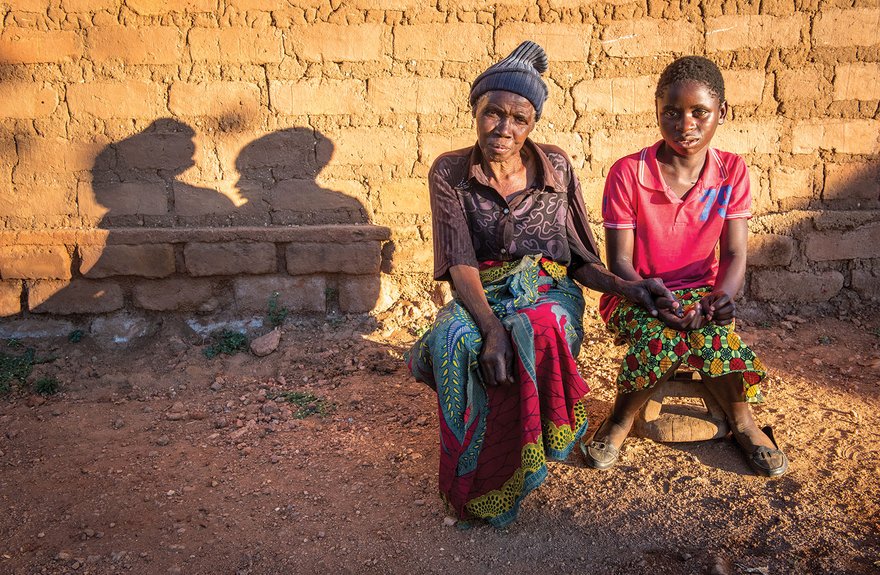
“World Vision has done a lot of work in Moyo,” says Joseph Kayafa, 47, who directs World Vision’s water programs in the area. The records certainly confirm it. In Moyo and a nearby community, teams have drilled more than 60 boreholes, which serve 250 people apiece, and installed five mechanized water systems that serve more than 500 people each — about 17,500 people total.
Joseph calls the boreholes and mechanized systems the “hardware.” “Every time we do this hardware, we complement it with promoting hygiene and sanitation facilities — the software,” he says. “For every borehole, we ensure that every house has the basics: a latrine, a hand-washing station, a refuse pit, dish racks, and a bathing shelter.”
Joseph notes that the clean water access helps everyone in the community. “Every household, whether they have sponsored children or not, benefits from a water point,” he says. “Water is a necessity of life.”
For Brendah, having clean water means she doesn’t miss school anymore due to water-related illness. That brings her closer to her dream of becoming a nurse.
Lightwell, 10: An outbreak of reading increases education
Next to Debby’s house lives Lightwell Mboyonga, who is 10. Lightwell is not yet sponsored, but he still gets to attend World Vision’s reading camp, held on weekends. Lightwell goes everywhere with a book in his hand.
“My favorite thing is reading,” he says. “I like it even more than football (soccer).”
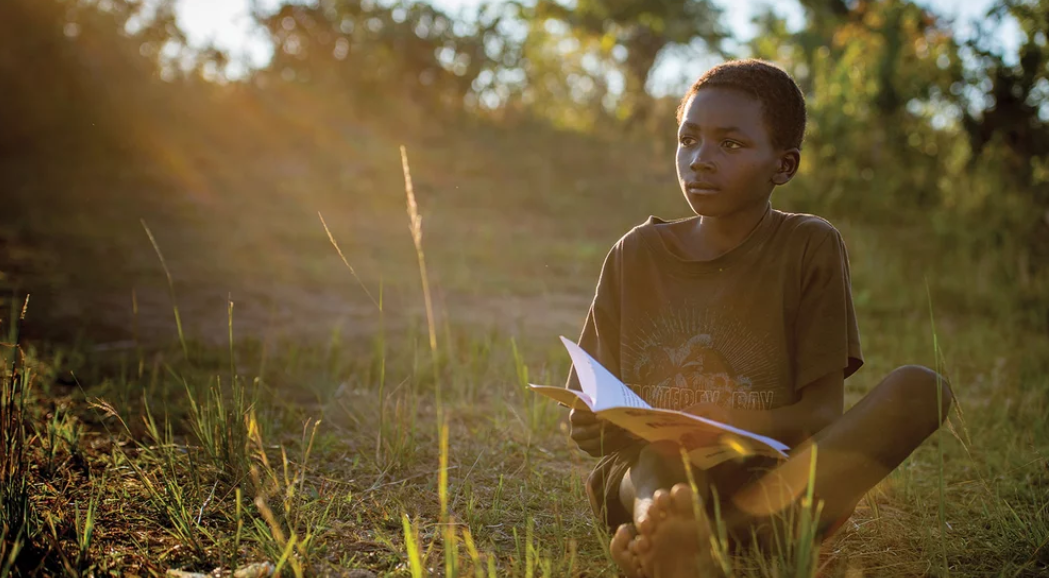
His uncle, Thomas Mambo, 45, has been a caregiver since 2009. Thomas says that in Moyo, “there has been an outbreak of reading. Children read everything they get their hands on.”
That’s true of Lightwell. As dozens of his friends kick around a soccer ball made of plastic bags, Lightwell is immersed in a book, oblivious to the happy chaos around him.
Reading camp starts in the first grade. “The first grade is the foundation of everything,” says Shepherd Chilombe, 48, who runs the program. “You can’t move forward if you don’t know how to read.”
Shepherd is a local expert who has trained members of Zambia’s Ministry of Education on how to educate community members — farmers, shop owners, and even teachers — in a new way of teaching.
In Moyo, students gather under trees and open fields. Lessons are interspersed with games. Teachers focus on individual children. Posters blow in the soft breeze, hanging from tree limbs with pictures that illustrate words in Tonga, the local language. The children sing their vowels: A, E, I, O, U, becomes A, E, I, O, moo when a cow passes by, drowning out the final vowel.
“Any child can go to the reading [camp] — both sponsored and nonsponsored,” says Shepherd.
Shepherd left a position with Zambia’s Ministry of Education to join World Vision. It surprised the World Vision human resources staff that he wanted to make such a change — going from a city job to one so rural. As so many World Vision staff do, he explained that he saw it as a calling. He wanted to work for God, and he wanted to give back to Moyo, his birthplace.
“My father was a cook at the mission hospital,” he says. “He used the little resources he was getting to send me to school.” Shepherd, who remembers struggling to read, is now helping thousands of kids like Lightwell.
Lightwell’s mother, Lillian, 27, says her children love World Vision’s reading camp. Children are supposed to come to camp with their own lunch, but Lillian’s children often attended without food, as it was scarce for the family until recently.
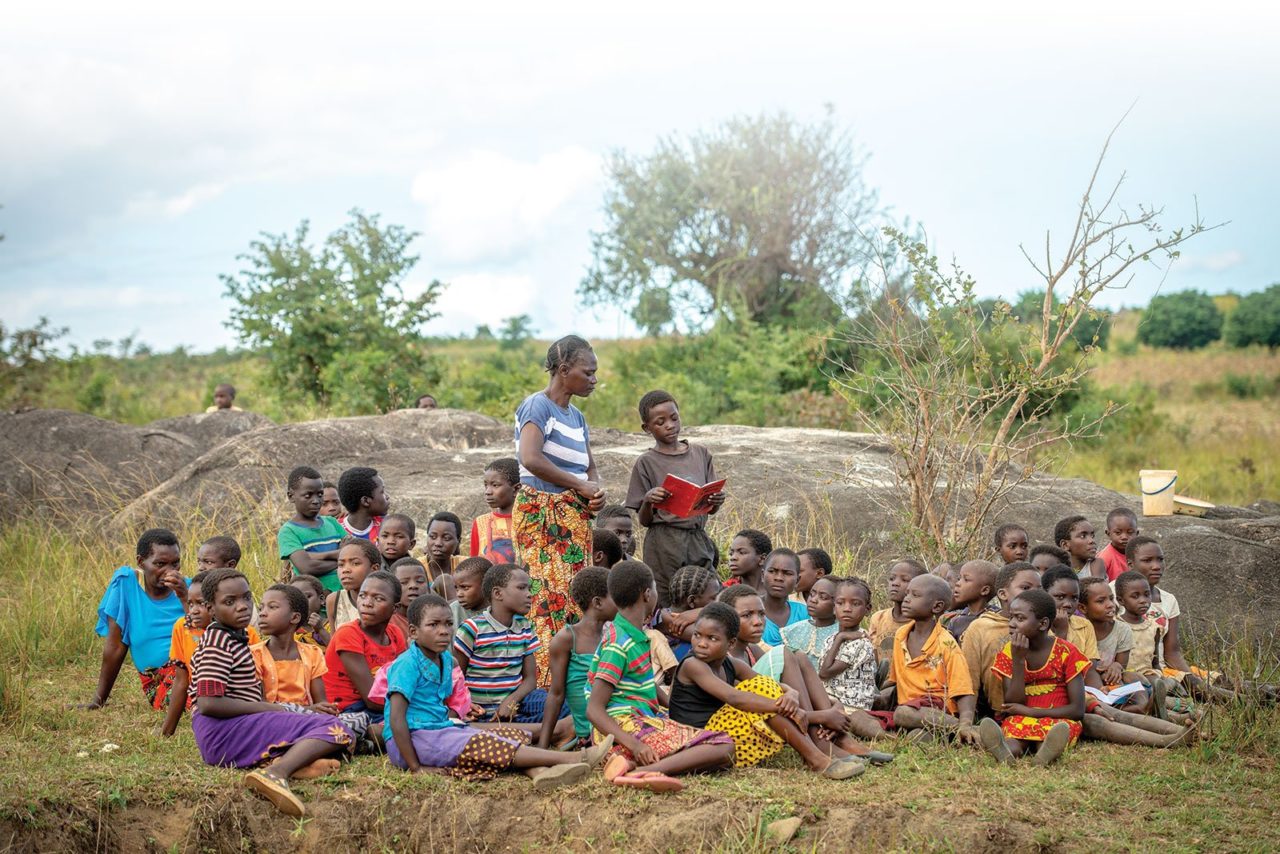
“Life was difficult because we would eat once in a day,” she says. “After that, we would go and beg for food.”
In 2014, the family received goats from World Vision. By selling the offspring, they gained income for food. Now they eat three times a day, and Lillian’s children can focus on learning.
In 2016, Lillian joined a savings group. “Now we have a bank within the community,” she says. Thanks to this new financial resource, she’s been able to pay Lightwell’s school fees. “I never went to school. But my child is able to read,” she says. “His future is guaranteed.”
She’ll do anything to support her children, yet says she faces one challenge: “[My children] want me to approve their homework. But I don’t know how to read.” Thankfully, this will soon change.
World Vision is starting a reading program for adults in Moyo, and Lillian will be first in line. “My greatest joy would be to read to the congregation,” she says. And she’ll be able to study with her son.
Lightwell wants his mother to read like he can. He hopes to become a teacher one day. “I will teach the children the way I am learning at reading camp,” he says.
Beatrice, 11: Economic empowerment enables her family to share
Another enthusiastic participant at reading camp, 11-year-old Beatrice Nzala, is as funny and feisty as her friend, Debby. Although Beatrice is not yet sponsored, she and her family benefits from World Vision’s agriculture work in Moyo.
Beatrice lives with her stepfather, Patrick, 51; her mother, Lifa Choobwe, 37; two sisters; and her little brother, Shadrack. Patrick is an exemplary farmer, growing sunflowers, beans, okra, tomatoes, and maize. “We have plenty of food,” he says. “We still have maize from last season.”
This is a miraculous turnaround from eight years ago. It started with a muscle spasm, and it wasn’t long before Patrick could barely walk because of the pain.
“I had given up. I thought, ‘This is my end,’” he says. “I used to sit on a mat made of sacks — all day, every day.” Patrick was one of the first people to receive goats through the World Vision Gift Catalog — a life ring thrown to a drowning man. Once the goats multiplied, he sold some to buy food.
“He was vulnerable but viable,” says 51-year-old Eugern Siawala, one of World Vision’s staff in Moyo who directs World Vision’s agriculture programs.
Eugern saw potential in Patrick — a man who didn’t even believe in himself. She got Patrick involved in a savings group and then suggested that Patrick take a small loan through World Vision’s microfinance program, VisionFund, which helps farmers and others build their livelihoods. With the pump he purchased, he’s been able to water more land and grow healthier, more abundant crops — all with support from Eugern.
“I’ve been working with him to ensure he moves from the level where he is to another,” she says.
Today, Patrick’s family is secure — making Christmas bright.
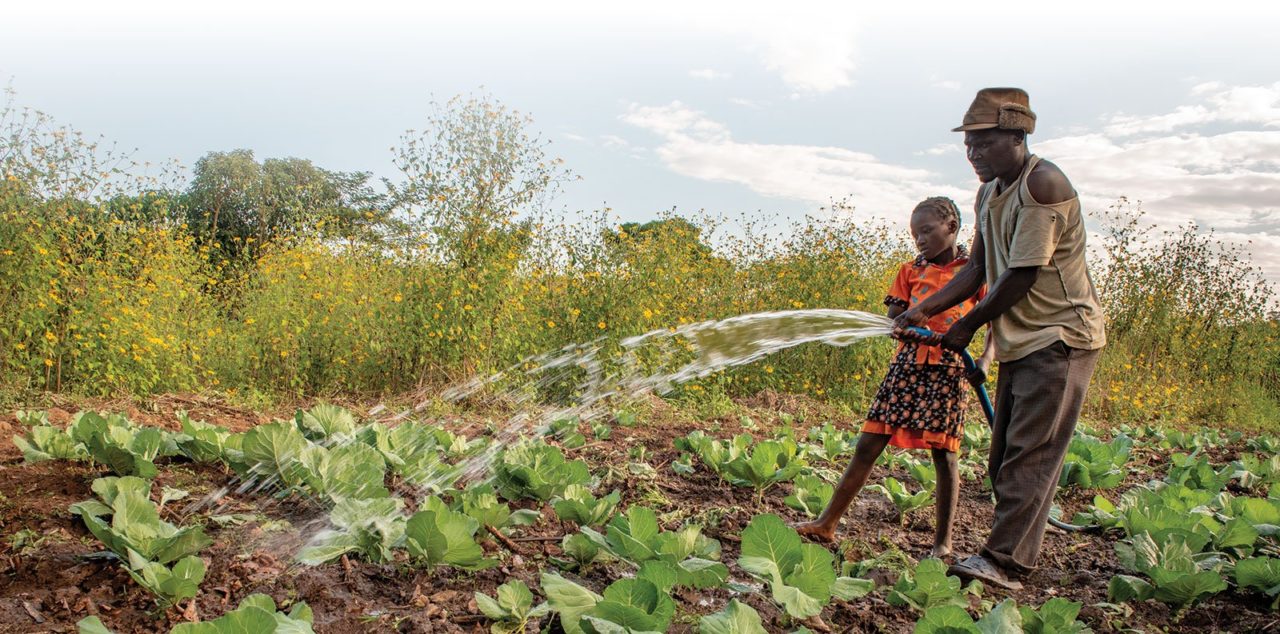
“Before, my children would look at other families celebrating. Because we didn’t have anything, we would feel sad,” he says. “Now that I have everything, my children can share with others.”
Instead of receiving goats, Patrick buys them. “Now my family has,” he says. “Before we had not. Now we have a good life.”
Adam, 5: Smiling bright in spite of health troubles
And then there’s Adam Mudenda, who attends Debby’s church. Adam, 5, was born in 2013, the same year NorthRidge Church took a Christmas offering to build two hospitals in southern Zambia, one of them only 2 miles from Adam’s home.
The clinic is critical for Adam. Recently he began vomiting, and his parents didn’t know why. His father, Ignatius, takes him for an examination.
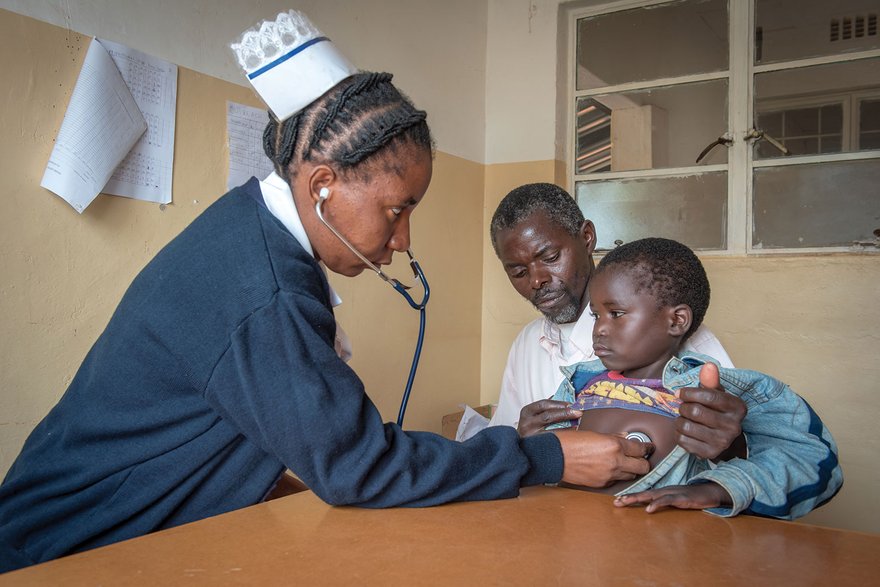
Christabel Payton, 33, a nurse here for eight years, examines the little boy. Adam tells her he’s been coughing and has tummy pains. Her diagnosis is troubling: possible peptic ulcers, probably from bacteria. “I’m happy that he came today,” she says.
So is Adam. As he looks at Nurse Christabel, he beams, his smile lighting up the room. That’s just Adam. Although he doesn’t feel well, he can’t help but smile — a toothy grin that transforms his face.
Although he’s not yet sponsored, Adam is being treated at a first-class facility that is available, thanks to sponsorship, right in his community — a place that previously had no healthcare.
“We will be able to do an ultrasound from here,” says Christabel. “We will have X-rays and even an operating theater.”
The nurse has seen big changes in Moyo. “When I came here, the clinic structures themselves were quite old,” she says. “World Vision painted and built new ones. We used to have a number of diseases because people used to fetch water from streams. The number of malnourished children has decreased.”
Christabel says that people who had left to find opportunity elsewhere are returning to Moyo. They know that because of sponsorship, Moyo now has more than enough — at no time more evident than at Christmas.
Christmas present: The difference child sponsorship makes
It’s Christmas night in southern Zambia. The rain has given way to the rustle of wind through the trees, heavy with mangoes. Obby gathers his family close: Debby and her brothers, still dressed in their new Christmas clothes. It’s been a long day of playing, singing, and worship. The children are stuffed with their favorite foods — chicken, rice, pumpkin leaves, and fresh bread with butter bought in town.
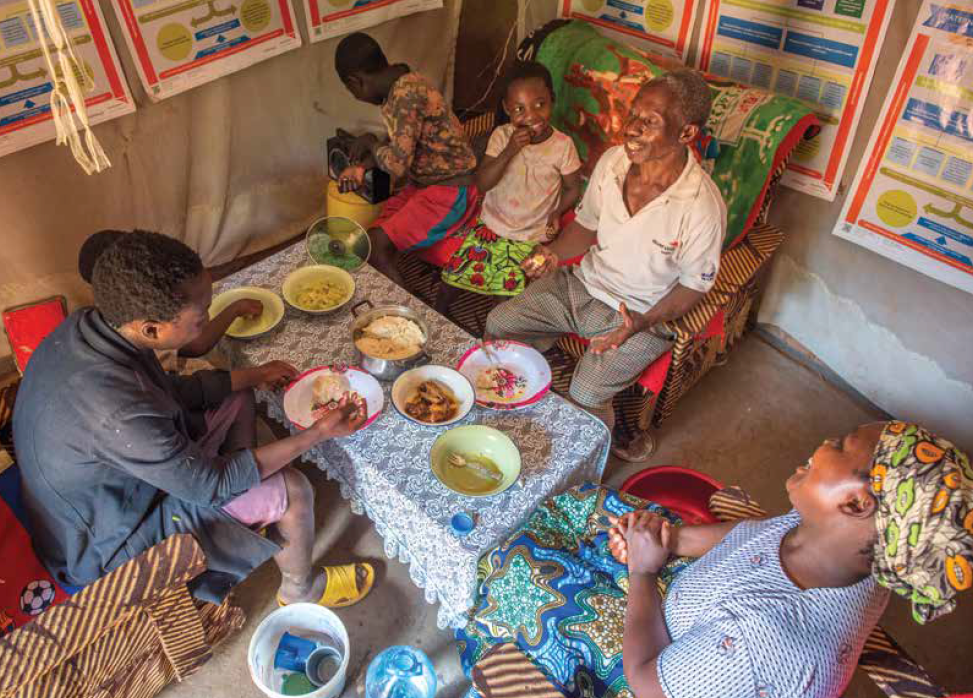
There is one more gift to share. “In the evening,” says Obby, “we explain the meaning of Christmas to the children — that it’s not all about that big dinner. The important thing about Christmas is Jesus.” The night ends with an acknowledgment of God’s most precious gift — a gift not only for Debby and her friends Brendah, Lightwell, Beatrice, and Adam, but for everyone — as God’s love is more than enough for all.
